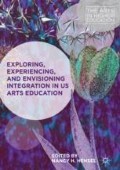Abstract
While universities usually offer creative writing courses as part of the traditional literature major, this arrangement can obscure the professional value of the skills taught in creative writing workshops (including storytelling, extended peer review, and concern for sentence craft). This chapter argues for the inclusion of creative writing courses in the professional writing curriculum and describes a program in which creative writers participate with aspiring journalists, editors, and marketing writers in an undergraduate writing and rhetoric major. Programs like these allow creative writing students to learn editing, digital media skills, and rhetorical history, while the professional writers and journalists develop empathy and other creative habits of mind as they practice collaboration and critique in writing workshops.
Access this chapter
Tax calculation will be finalised at checkout
Purchases are for personal use only
Notes
- 1.
“Framework for Success in Postsecondary Writing.” Council of Writing Program Administrators, the National Council of Teachers of English, and the National Writing Project, accessed August 2016, http://wpacouncil.org/framework.
- 2.
Thomas P. Miller, The Formation of College English: Rhetoric and Belles Lettres in the British Cultural Provinces (Pittsburgh: University of Pittsburgh Press, 1997), 285.
- 3.
Christian Weisser and Laurie Grobman, “Undergraduate Writing Majors and the Rhetoric of Professionalism,” Composition Studies 40 (2012): 39.
- 4.
Deborah Balzhiser and Susan H. McLeod, “The Undergraduate Writing Major: What Is It? What Should It Be?” College Composition and Communication 61 (2010): 418.
- 5.
Candace Spigelman and Laurie Grobman, “Why We Chose Rhetoric: Necessity, Ethics, and the (Re)Making of a Professional Writing Program,” Journal of Business and Technical Communication 20 (2006): 55.
- 6.
Dominic Delli Carpini , “Re-Writing the Humanities: The Writing Major’s Effect on Undergraduate Studies in English Departments,” Composition Studies 35 (2007): 16.
- 7.
Kristie S. Fleckenstein and Kathleen Blake Yancey, “A Matter of Design: Context and Available Resources in the Development of a New English Major at Florida State University,” in Writing Majors: Eighteen Program Profiles, ed. Greg A. Gibberson, Jim Nugent, and Lori Ostergaard (Logan: Utah State UP, 2015), 175.
- 8.
Greg A. Gibberson, Jim Nugent, and Lori Ostergaard, eds, Writing Majors: Eighteen Program Profiles (Logan: Utah State UP, 2015).
- 9.
Spigelman and Grobman, “Why We Chose Rhetoric,” 58.
- 10.
Weisser and Grobman, “Undergraduate Writing Majors,” 39–59.
- 11.
Douglas Hesse, “The Place of Creative Writing in Composition Studies,” College Composition and Communication 62 (2010), 31–52.
- 12.
Mark Runco calls creativity “the ultimate economic resource.” Mark Runco, “Creativity,” Annual Review of Psychology 55 (2004): 658–677.
- 13.
Alexandria Peary, “The Pedagogy of Creative Writing across the Curriculum,” in Creative Writing Pedagogies for the Twenty-First Century, eds. Alexandria Peary and Tom C. Hunley (Carbondale: Southern Illinois University Press, 2015), 344.
- 14.
Richard E. Vatz , “The Myth of the Rhetorical Situation,” Philosophy & Rhetoric 6 (1973): 157.
- 15.
Lisa Ede and Andrea Lunsford, “Audience Addressed/Audience Invoked: The Role of Audience in Composition Theory and Pedagogy,” College Composition and Communication 35 (1984): 160.
- 16.
Michael Dean Clark, “The Marketable Creative: Using Technology and Broader Notions of Skill in the Fiction Course,” in Creative Writing in the Digital Age, eds. Michael Dean Clark, Trent Hergenrader, and Joseph Rein (London: Bloomsbury Publishing, 2015): 64.
- 17.
Janelle Adsit, “Giving an Account of Oneself: Teaching Identity Construction and Authorship in Creative Nonfiction and Social Media,” in Creative Writing in the Digital Age, eds. Michael Dean Clark, Trent Hergenrader, and Joseph Rein (London: Bloomsbury Publishing, 2015):106.
- 18.
Ellen Bryant Voigt, The Flexible Lyric (Athens: University of Georgia Press, 1999), 124.
- 19.
Barack Obama and Marilynne Robinson, “President Obama & Marilynne Robinson: A Conversation—II,” New York Review of Books, November 19, 2015.
- 20.
John Perron, Mary Rist , and Drew Loewe, “From Emphasis to Fourth-Largest Major: Learning from the Past, Present, and Future of the Writing Major at St. Edward’s University,” in Writing Majors: Eighteen Program Profiles, eds. Greg A. Gibberson, Jim Nugent, and Lori Ostergaard (Logan: Utah State UP, 2015): 208.
- 21.
Delli Carpini , “Re-Writing the Humanities,” 17.
Author information
Authors and Affiliations
Editor information
Editors and Affiliations
Rights and permissions
Copyright information
© 2018 The Author(s)
About this chapter
Cite this chapter
Rist, M., West, S. (2018). Creative Writing for Professional Writing Majors. In: Hensel, N. (eds) Exploring, Experiencing, and Envisioning Integration in US Arts Education. The Arts in Higher Education. Palgrave Macmillan, Cham. https://doi.org/10.1007/978-3-319-71051-8_10
Download citation
DOI: https://doi.org/10.1007/978-3-319-71051-8_10
Published:
Publisher Name: Palgrave Macmillan, Cham
Print ISBN: 978-3-319-71050-1
Online ISBN: 978-3-319-71051-8
eBook Packages: EducationEducation (R0)

